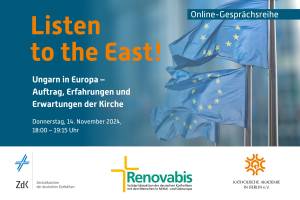Source: Yaroslav Danylchenko Mission, experiences and expectations of the church
Recording of the Event
Subject of the Event
Hungary took over the EU Council Presidency on July 1, 2024. Politically, the country is often viewed critically. Against this background, we would like to look in particular at the perspective of the (Catholic) Church.
What is its view on issues such as migration, the war against Ukraine and the way of handling Christian values in the EU? How does the Church see its role in Europe? What can and would it like to contribute based on its specific historical experiences? What expectations does it have to deal with? What is its position on the politics of the Hungarian government? During his visit to Hungary in April 2023, Pope Francis also spoke with Prime Minister Viktor Orbán, warned against a flare-up of nationalism and called for charity and solidarity in Europe.
On the one hand, Christianity is very important for the politics of the ruling Fidesz party, but on the other hand, the number of believers has fallen sharply in recent years. What is the state of the church in Hungary and what can its future look like?
We listened to and spoke with:
- Cirill T. Hortobágyi OSB, Archabbot of Pannonhalma, Abbot President of the Hungarian Benedictine Congregation, Pannonhalma
- Dr Kornélia R. Kiss, Journalist, i.a. co-founder of the independent Hungarian weekly newspaper “Magyar Hang”, Budapest
- Dr Gergely László Rosta, Associate Professor of Sociology at the Catholic Péter Pázmány University, Budapest, Chair representative at the University of Münster
- Moderation: Markus Leimbach, Head of the Eastern Europe Department of the Catholic Academic Service for Foreigners (KAAD), Bonn
The event was held with translation in German and English.
About the Online Series „Listen to the East“
Experiences, perceptions and analyses of the social and societal situation in Eastern Europe are the subject of the online discussion series „Listen to the East“. It is organized by Renovabis, the ZdK and the Catholic Academy in Berlin.
Contact
Heike Faehndrich, Renovabis, hf@renovabis.de
Claudia Gawrich, Central Committee of German Catholics (ZdK), claudia.gawrich@zdk.de
Dr. Maria-Luise Schneider, Katholische Akademie in Berlin, schneider@katholische-akademie-berlin.de

